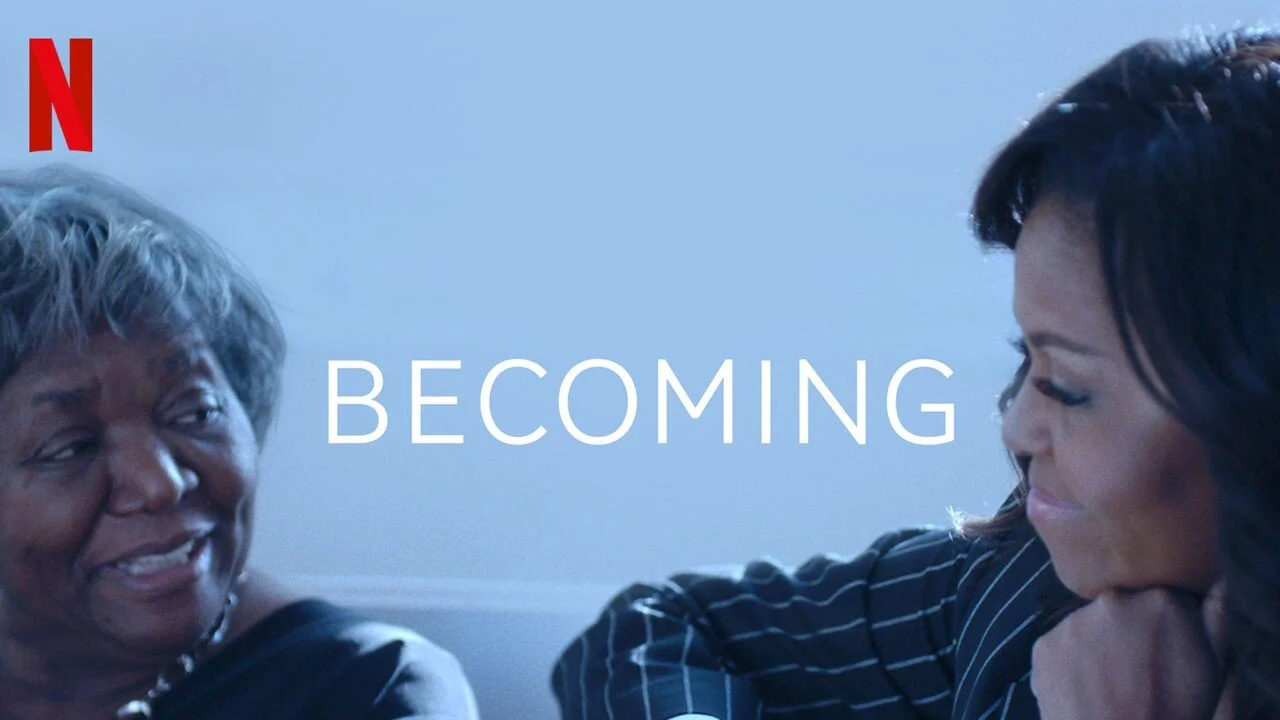Michelle Obama, Becoming: It Is Hard To Hate People Close Up
Photo courtesy of Netflix
Michelle Obama’s, Becoming, documentary is out now on Netflix.
Have you seen it? How did you feel? Did you think about Amaud Arbery? I did. I was writhing in discomfort. So much easier to tuck my discomfort away. Because I am white, I don’t have to walk around scared.
But my mind served me up a memory from high school running days. How often did we climb someone’s fence to find the hose in their backyard? We were trespassing. Breaking the law. We ran through new housing construction in Yorba Linda. We would cross the “no trespassing barrier” and go inside some of the houses being worked on. All I can think about is if I were black and male what might have happened to me. Michelle’s voice brings me back to the present moment. She says “It is hard to hate people close up.” (Then I noticed how much Covid19 has gotten to me because watching her hug and touch so many people I shuddered a little bit inside.)
Becoming showed Michelle Obama enduring the campaign trail, when every off the cuff comment she made, the innocent vulnerability she displayed, or the strength of her character and intellect rubbed the media the wrong way. After all, she was a woman, and she was black. “Who did she think she was?” It must have been lonely. And what I have learned is loneliness is unjust. Read on. I will get to this.
I flipped off my TV and sat. Listened inward. I was overcome by gratitude for Michelle Obama and inspired by her courage to persevere. But how. I know “missionary activism” is not my thing where I help folks “out there” but my life and heart aren’t really impacted, in here. Listening is up close and the way we do it here is to be changed. Leading daily with justice in mind is activism. Confronting my mistakes is activism. Paying people what they are worth, is activism. Setting clear boundaries rather than engaging in saviorism is activism. Again, listening is activism.
“It is hard to hate people close up!” This sentiment was really my first inspiration to sit on a sidewalk and listen to strangers. Eric Garner’s killing was the last straw to finally go do it. The Trayvon Martin verdict was the motivation to keep going. And now the Covid19 pandemic a new source of inspiration.
Some people’s stories are given more attention and weight than others’.
And our bias shapes “how” we listen. Our body quite literally takes shape depending on the power perceived by the two individuals in the dialogue. Listening with equality in mind is dismantling in the here and now of bias and injustice if we use the Sidewalk Talk listening principles.
The new Sidewalk Talk website talks a lot about loneliness and you may wonder, “What is the link, Traci, between injustice and loneliness?”
Did you know that people of color and immigrants suffer more loneliness than white folks in America? One can wonder why? It ain’t just about not having friends, I will tell you that. Loneliness is also caused by all the ways a society systemically says “You do not matter.” A black man coming out of an empty house is a criminal. A teen girl, a runner.
This week, six therapists of color will be recording an episode for the Sidewalk Talk podcast to talk about blind spots in the field of psychotherapy. It will be a hard conversation for some folks to listen to, I am sure. And yet, that is what we do at Sidewalk Talk. We listen and lean in. We aren’t helping, we are showing up as equals. Curios. Ready to be influenced.
Sidewalk Talk listeners come with the humility that, like meditation, we have a lot to learn and practice in our listening. Yes, even therapists. Facing our listening blind spots is activism. Asking folks for a small sum of money to join creates internal justice so our workers aren’t underpaid and overworked.
If you have the earnest desire to practice listening, get involved. And if you are a leader of color in the USA, apply for a community grant that will waive your startup costs and send you supplies to start a Sidewalk Talk chapter. May we all become better listeners and be inspired by Michelle Obama to develop the fortitude to lean in to listen even when it challenges us.

